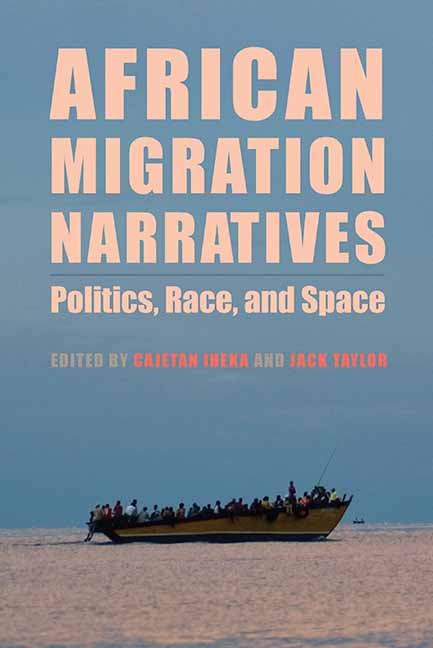Book contents
- Frontmatter
- Contents
- Acknowledgments
- Introduction: The Migration Turn in African Cultural Productions
- Part One African Migration on the Screen: Films of Migration
- 1 Harragas, Global Subjects, and Failed Deterritorializations: The Tragedies of Illegal Mediterranean Crossings in Maghrebi Cinema
- 2 Nollywood Comedies and Visa Lotteries: Welfare States, Borders, and Migration as Random Invitation
- 3 Accented Cinema: The Context of Nollywood
- 4 Migrations and Representations: The Cinema of Griot Dani Kouyaté
- Part Two Forgotten Diasporas: Lusophone and Indian Diasporas
- Part Three Migration against the Grain: Narratives of Return
- Part Four Migration and Difference: Indigeneity, Race, Religion, and Poetry at the Margins
- Bibliography
- Notes on Contributors
- Index
4 - Migrations and Representations: The Cinema of Griot Dani Kouyaté
from Part One - African Migration on the Screen: Films of Migration
Published online by Cambridge University Press: 26 July 2019
- Frontmatter
- Contents
- Acknowledgments
- Introduction: The Migration Turn in African Cultural Productions
- Part One African Migration on the Screen: Films of Migration
- 1 Harragas, Global Subjects, and Failed Deterritorializations: The Tragedies of Illegal Mediterranean Crossings in Maghrebi Cinema
- 2 Nollywood Comedies and Visa Lotteries: Welfare States, Borders, and Migration as Random Invitation
- 3 Accented Cinema: The Context of Nollywood
- 4 Migrations and Representations: The Cinema of Griot Dani Kouyaté
- Part Two Forgotten Diasporas: Lusophone and Indian Diasporas
- Part Three Migration against the Grain: Narratives of Return
- Part Four Migration and Difference: Indigeneity, Race, Religion, and Poetry at the Margins
- Bibliography
- Notes on Contributors
- Index
Summary
This chapter analyzes how contemporary diasporic black African filmmakers deal with the issues of representation, migration, and plural cultural affiliations. Since Ousmane Sembène's 1966 La noire de … (Black girl …), one of the first sub-Saharan African films, migration has been a central issue in African cinema. In this chapter, I demonstrate how migration is a source of inspiration, both as the subject of their films and as a lived experience that migrant diasporic filmmakers draw on to create their films. I argue that migration, a physical dislocation, can become a metaphorical, perceptive, and ontological movement, as well as a change in position that allows a new view, a shift in one's identity that transforms vision and shapes narratives. By simply crossing a border, one's subjectivity and cultural affiliation shifts. The dislocation shifts the migrant's gaze and its focal point, changing distances, perspectives, and creating new subjectivities. This decentering gives diasporic filmmakers a new dynamic multiaxial perspective to incorporate into their films.
To explore how migrant sensibility operates in film, I analyze four features by Dani Kouyaté. Three of the films are fictional dramas: Keïta! l'héritage du griot (Keïta! The heritage of the griot, 1995), Sia, le rêve du python (Sia, the dream of the python, 2001), and Medan Vi Lever (While we live, 2016). In addition to these dramatic films I also interrogate Kouyaté's documentary Souvenirs encombrants d'une femme de ménage (Burdening memories of a cleaning lady, 2008). This corpus will help us appreciate how his work is derived from the assembly of different filmic components indebted to cultural hybridity, stemming from Kouyaté's diasporic upbringing.
Filming from Elsewhere: Migration and New “Interpretative Frames”
Without denying the very personal aspects of artistic subjectivity, I show how these films arise from the condition of migrancy and from cultural hybridity that migration produces. Kouyaté's films can be seen as “accented” following Hamid Naficy's definition. As the Iranian critic argues, the filmmaker's background is crucial to the production of accented cinema as many films are in part inspired by lived experience, at both personal and collective levels.
- Type
- Chapter
- Information
- African Migration NarrativesPolitics, Race, and Space, pp. 68 - 84Publisher: Boydell & BrewerPrint publication year: 2018

